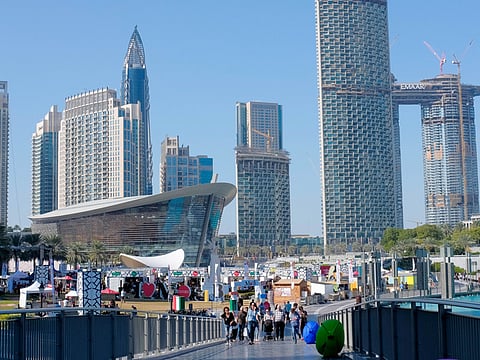Holiday home firms pursue options after Downtown shutout
They are making a case with DTCM as licensing authority to intervene ahead of peak season

Also In This Package
Dubai: Holiday home operators in Dubai are seeking legal advice on whether a master-developer can enforce a blanket ban on their operations within a community.
According to sources, the Dubai Tourism and Commerce Marketing (DTCM) has clear-cut guidelines on licensing holiday homes/short-term rentals in this market.
They point to two of these requirements:
Forbidding short-term rentals
This being the case, holiday home operators want to know whether a master-developer can voluntarily cease all such operations within a community.
According to Vinayak Mahtain, CEO of bnbme, an operator: “We don’t consider a notice from a developer as a legal document forbidding us from short-term rentals.
“The governing authority to ban holiday homes is DTCM, which has not made any statement as of yet. Until they do, we continue to operate on 'business as usual'.
“Billions of dirhams have been spent on Dubai’s brand globally as a tourist destination. Guests have booked properties weeks and moths back — if they show up on September 20th and don’t have a place to stay, this will destroy the Dubai branding. I have full confidence the authorities will not allow this to happen.”
Downtown Dubai saga
Holiday home operators were caught on the wrong foot late last Wednesday after Emaar issued a circular stating clearly that come September 19, all such short-term leasing activities within Downtown Dubai should stop.
The circular goes on to state that the action was being taken after complaints from residents regarding the leasing of neighbouring units on short-term lets.
In a statement, Anna Skigin, CEO of Frank Porter: “We understand the concerns raised about short-term rentals… and these are global concerns. We accept and welcome regulations from buildings that ensure standards are kept high. This makes both the sector and the operators better.
We understand the concerns raised about short-term rentals… and these are global concerns. We accept and welcome regulations from buildings that ensure standards are kept high. This makes both the sector and the operators better.Anna Skigin, CEO of Frank Porter
“However, we do take issue with how this was handled — clients received a two-week notice to cease holiday home operations in their Emaar Downtown properties.
"It is extremely unfortunate for the owners, our clients who count on this income and who have invested in an Emaar property in order to let it out on a short-term basis.
“They have not been asked or even given time to settle the situation - especially as most are living abroad. It could have been handled better.”
Deadline
As the clock ticks towards September 19, all eyes are now on DTCM on whether they would step in to clarify their stance. Already, some of the leading holiday home operators have taken up this issue with the authority. Their belief is that they may be allowed more time.
“The Downtown Dubai remains among the top three holiday home destinations in the city - to now be restricted from leasing there when the new season opens will be disastrous for business,” said one operator. "We cannot suddenly lose this destination - what if other master-developers suddenly decide they too will join in and prevent holiday homes?"
What the law states
According to the Dubai laws, “Holiday homes may be licensed throughout Dubai, including free zones, special development zones and real estate communities, as determined by DTCM (Department of Tourism and Commerce Marketing). “Owners, authorized tenants, operators, guests and visitors are to follow Dubai laws, as well as rules regulating the use of communal areas within jointly owned buildings and real estate communities.”
Sign up for the Daily Briefing
Get the latest news and updates straight to your inbox



